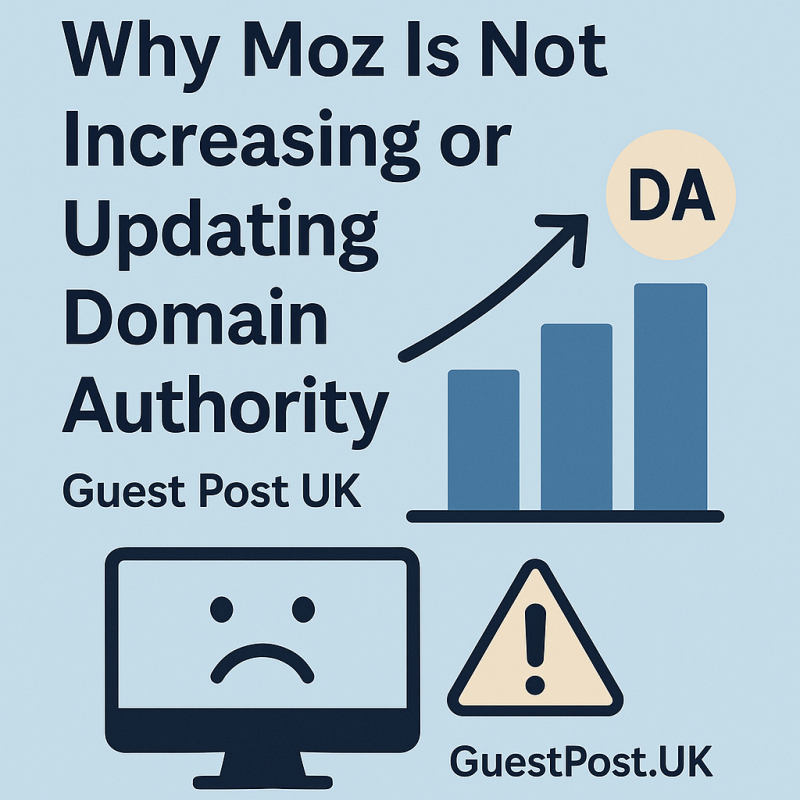
Introduction to Domain Authority (DA)
Domain Authority (DA) is a metric developed by Moz that predicts how likely a website is to rank on search engine result pages (SERPs). It ranges from 1 to 100, with higher scores indicating a greater ability to rank. The score is calculated based on various factors, including backlink profile, domain age, and overall SEO health.
DA is not a Google ranking factor, but is widely used in SEO to benchmark websites against competitors. Many SEO professionals, agencies, and businesses, including Guest Post UK (https://GuestPost.UK), use DA to assess the quality of a domain for link-building or outreach campaigns.
Why Moz Is Not Increasing or Updating Domain Authority
Many website owners become concerned when their Domain Authority score doesn’t improve or seems stuck. There are several reasons why Moz is not increasing or updating Domain Authority, including:
1. Moz Index Update Delays
Moz relies on its own link index to calculate Domain Authority. If their index hasn’t recently been updated, your DA won’t reflect recent changes to your backlink profile. Unlike Google’s frequent crawls, Moz updates its index less often, which can sometimes result in delays.
2. Insufficient High-Quality Backlinks
Even if you’re building backlinks, they may not be from high-quality domains. Moz weighs links from authoritative sources more heavily. Guest posts from low DA sites or spammy links won’t contribute much to your score.
3. Poor Link Diversity
If your backlinks are coming from the same sources repeatedly, Moz might not view them as beneficial. A diverse link profile with links from various unique domains improves Domain Authority.
4. Negative SEO or Spammy Links
Toxic or spammy backlinks can negatively impact your DA. Moz detects these and could either discount them or penalise your DA score.
5. Competitor Improvement
DA is a relative score. If your competitors improve their link profiles, your DA might appear stagnant even if you’re gaining links. It’s a zero-sum game in some niches.
6. Site Technical Issues
Crawling and indexing errors, slow page speed, broken links, and non-secure connections (HTTP instead of HTTPS) may prevent Moz’s crawler from properly evaluating your website.
7. On-Page SEO Deficiencies
Domain Authority considers overall SEO health. If your site has poor on-page SEO, duplicate content, or lacks metadata, it can indirectly affect your authority metrics.
What to Do If Your Domain Authority Is Not Increasing
1. Wait for Moz Index Refresh
Be patient and monitor when Moz updates its index. You can check the Moz Blog or the MozBar extension for the latest updates.
2. Audit Your Backlink Profile
Use Moz, Ahrefs, or SEMrush to examine your backlinks. Disavow or remove spammy links and focus on acquiring links from high-DA, relevant sites.
3. Improve Content Quality
Create valuable, shareable content. In-depth blog posts, original research, and infographics can attract organic backlinks over time.
4. Strengthen Technical SEO
- Ensure fast loading times
- Optimise for mobile devices
- Secure your site with HTTPS
- Fix crawl errors using tools like Google Search Console
5. Boost On-Page Optimisation
- Use relevant keywords naturally
- Optimise headers, meta titles, and descriptions
- Avoid keyword stuffing or duplicate content
6. Use Guest Posting Effectively
Collaborate with reputable platforms like Guest Post UK to publish high-quality guest content that links back to your site. Focus on contextually relevant placements.
7. Diversify Your Link Sources
Gain links from multiple domains, including:
- Niche blogs
- Online magazines
- Directories (avoid spammy ones)
- Local business listings
8. Check for Manual Penalties
Although Moz doesn’t penalise, Google might. A penalty from Google won’t directly lower DA, but could reduce traffic and indirectly harm authority.
Common Errors and Issues That Affect Domain Authority
1. 404 Errors and Broken Pages
When Moz’s crawler hits broken pages, it may reduce crawl efficiency, affecting DA.
2. Improper Redirects
Using temporary (302) instead of permanent (301) redirects can dilute link equity.
3. Duplicate Meta Tags and Titles
Duplicate content confuses search engines and affects crawlability, indirectly impacting DA.
4. Lack of Internal Linking Structure
Internal links distribute authority within your site. A poor structure can lead to orphaned pages and lower perceived value.
5. No XML Sitemap or Robots.txt
Without proper directives, Moz might miss parts of your site.
Reasons for Domain Authority Decrease
If your domain authority drops, it can be due to:
- Lost high-quality backlinks
- Decrease in referring domains
- Increase in spammy backlinks
- Competitor gains
- Changes in Moz’s algorithm
- Poor technical SEO performance
How to Increase Domain Authority
1. Acquire Authoritative Backlinks
- Reach out to high-DA sites
- Use HARO for media links
- Offer testimonials for backlinks
2. Content Marketing Strategy
- Target informational keywords
- Use internal links strategically
- Promote on social media
3. Engage in PR Campaigns
Brand mentions and PR links can significantly impact DA. Leverage industry news to pitch journalists.
4. Consistent Content Publishing
Update your blog regularly. Frequency builds authority and keeps crawlers coming back.
5. Partner with Agencies Like Guest Post UK
Agencies specialising in link-building, like Guest Post UK, offer scalable outreach and guest post services, ensuring high-DA backlinks and improved visibility.
Final Thoughts
Understanding why Moz is not increasing or updating Domain Authority requires patience, strategy, and continuous SEO effort. Domain Authority is a reflection of your website’s backlink profile and overall health, and stagnation usually signals the need for better-quality links, content, or technical optimisation.
If you’re stuck, start with a complete SEO audit and seek expert help. Guest Post UK (https://GuestPost.UK) specialises in guest posting and link-building strategies tailored to help improve your website’s authority and visibility.
Frequently Asked Questions (FAQs)
Q1: How often does Moz update Domain Authority?
Moz typically updates its index monthly, but there may be delays. Check Moz’s official blog for updates.
Q2: Can my DA go down even if I’m building links?
Yes. If the links are low quality or competitors are improving faster, your DA may drop or remain the same.
Q3: Is Domain Authority important for SEO?
DA is not a Google ranking factor, but it helps estimate a site’s competitiveness and value in link-building.
Q4: Will Guest Posting increase my DA?
Yes, if done on high-quality, relevant websites. Avoid spammy guest post farms.
Q5: What is a good DA score?
DA scores are relative. A DA of 30-40 is average, 50+ is strong, and 60+ is excellent for most niches.
Need Help Improving Your Domain Authority? Visit GuestPost.UK. We offer UK-based clients the opportunity to explore our blog writing, guest posting, and SEO packages, tailored to boost Domain Authority. Contact us today or send an email at info@guestpost.uk







